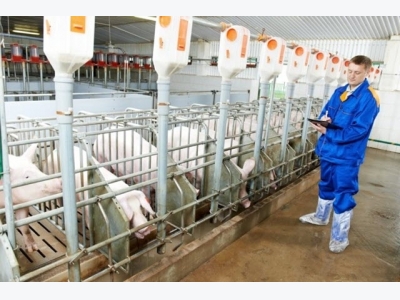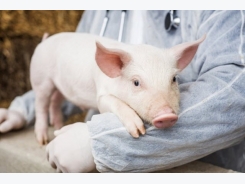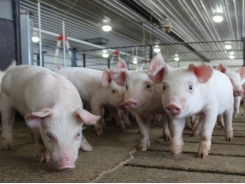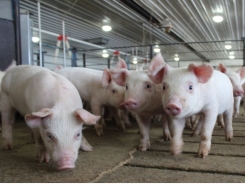Red pepper essential oil may aid nutrient digestion in piglets

Animal scientists in Brazil examined the use of Brazilian red pepper essential oil in the diet of weanling pigs for growth and gut health.
Their results of the research were published in the journal of Livestock Science.
“This study aimed to evaluate the effects of dietary Brazilian red pepper (S. terebinthifolius Raddi) essential oil and an antimicrobial agent on the growth performance, diarrhea occurrence, pH of digestive content, small intestine histology, and intestine microbial counts of weanling pigs,” said the researchers.
The team members found the essential oil feed additive had more influence in a lower dose than a higher one on villi density. "Greater densities of villi enhance the ability to digest and absorb nutrients," said the authors.
But that the supplement may show little effect in a low-challenged environment.
“Treatments had no effect on growth performance, diarrhea occurrence, pH of the digestive content, villus height, crypt depth, and intestinal microbial counts of weanling pigs,” said the researchers. “However, pigs fed the diet containing 500 mg/kg essential oil had greater villi density than those fed diets containing the antibiotic or 1000 and 1500 mg/kg essential oil.”
Why red pepper?
There is a growing interest in the use of natural additives for disease control in animals, especially as more is understood about the active components in plants and their potential actions, said the researchers.
Antibiotic growth promoters have been commonly used to improve piglet development during weaning, but concerns regarding bacterial cross-resistance is starting to limit their use, they said. “Thus, the potential application of plant extracts, essential oils, oleoresins, and their purified compounds is being investigated as alternative feed strategies to enhance weanling pig performance during this critical period,” they added.
Brazilian red pepper has shown some antimicrobial potential during in vitro examination, and is reported to have antioxidant, anti-tumoral and antifungal properties, they said. In a previous study looking at its use in broiler feed, an increase in chick weight gain and final body weight was seen.
“It has been hypothesized that red pepper could replace performance enhancing antibiotics also in weanling pig diets,” said the researchers. “To our knowledge, there are no studies that [have] evaluated Brazilian red pepper in swine feed.”
Study details
In the study, 90 piglets were given one of five diets including a control, a diet with increasing levels of red pepper essential oil at 500, 1,000 and 1,500 mg/kg red pepper essential oil and a diet with 120 mg/kg chlorhydroxyquinoline – an antibiotic additive.
Animal weights and feed disappearance were recorded to calculate average daily feed intake, average daily gain and the gain:feed ratio, they said.
Diarrhea incidents also were noted.
At the end of the feeding trial, pigs in each group were harvested and the pH of the digestive tract was recorded along with small intestine histology and intestinal microbial counts, they said.
Results
The feed additive was not found to have an influence on growth performance or occurrence of diarrhea, said the researchers. Digestive pH, villus height, crypt depth and intestinal microbial counts were similar for pigs getting all diets.
But piglets getting the diet with 500mg/kg of the essential oil additive had improved villi density compared to the other groups, they said.
“The lack of positive results of chlorhydroxyquinoline may be due to rigorous sanitary control of the facilities, low challenging situations,” they said. “Besides, the possible broad-spectrum activity of this antimicrobial may have caused the imbalance between beneficial and pathogenic microbiota and, consequently, showed no beneficial effects.”
There were no previous research on the use of the essential oil in swine feed to draw a comparison, said the researchers. However, the amounts used in the poultry study, 4,000 mg/kg, were much higher, which may have contributed to the difference in response.
“Both Brazilian red pepper essential oil and the antibiotic are of limited benefit for enhancing the growth of weanling pigs,” they said. “However, the effectiveness of growth enhancer additives may be reduced in low challenging situations as demonstrated by the current study.”
Additional research is needed to better understand the compounds present in the essential oil to understand their potential use or application in different conditions for swine production, they said.
Related news
Tools

Phối trộn thức ăn chăn nuôi

Pha dung dịch thủy canh

Định mức cho tôm ăn

Phối trộn phân bón NPK

Xác định tỷ lệ tôm sống

Chuyển đổi đơn vị phân bón

Xác định công suất sục khí

Chuyển đổi đơn vị tôm

Tính diện tích nhà kính

Tính thể tích ao




 What canola by-products are beneficial for grower pigs?
What canola by-products are beneficial for grower pigs?  Wheat-DDGs drop feed efficiency in young swine diets,…
Wheat-DDGs drop feed efficiency in young swine diets,…